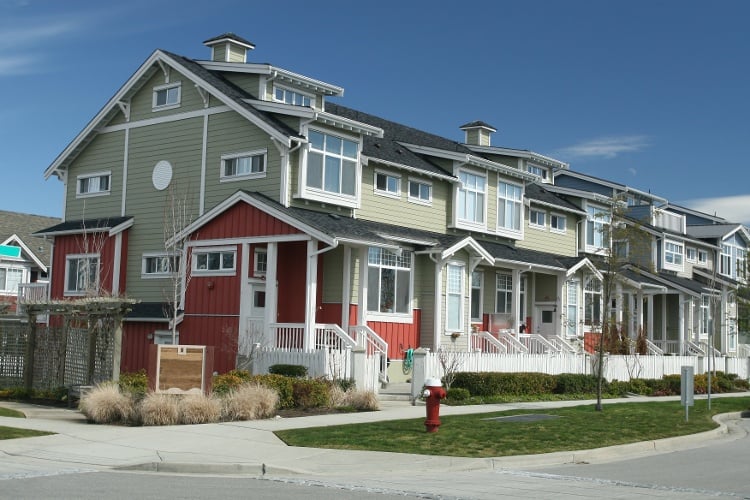cawacko
Well-known member
Locked in rates means less people want to move which means less supply on the market and more people bidding on the existing houses driving up home values to record levels. Anyone here in that situation (wanting to move but have to good of a rate so you essentially can't)?
If you locked in a dirt-cheap mortgage when interest rates were low, congratulations for being one of the winners in America’s skewed housing market. Renters, realtors and recruiters are among those getting the raw end of the deal.
High interest rates have had an unexpected impact on U.S. housing. Instead of triggering a fall in home prices, as happened with commercial real estate, costlier mortgages have pushed residential values higher. The value of the median existing home rose to a record $419,300 in May, according to the National Association of Realtors. Before the pandemic, it was $270,000.
Blame the “lock-in” effect of ultracheap mortgages secured when interest rates were low, which are trapping owners in their homes. It is an unforeseen consequence of years of easy money. Two-thirds of outstanding U.S. mortgages have a rate below 4%, according to Morgan Stanley’s housing strategist Jim Egan. Were these homeowners to move, they would have to pay close to 7% for a new 30-year mortgage. The gap hasn’t been as wide since at least the late 1980s.
Compounding the lock-in effect, most people have fixed-rate mortgages today. More than 90% of newly issued home loans in recent years were 30-year fixed-rate loans, compared with two-thirds in the run-up to the 2008 housing crash.
As more owners stay put, the number of homes on the market has fallen. Tight supply is pushing prices higher, shrinking the pool of buyers who can afford a home. A household earning $100,000 a year can only afford 37% of home listings today, according to the NAR. In a balanced market where there is around five months’ supply of inventory available the number should be 62%.
The frozen housing market has economic consequences. Spending linked to home sales has dropped. People normally splurge to fix up houses before putting them on the market or to renovate them after they move in. Work has dried up for professionals handling the logistics of transactions, such as attorneys and real-estate brokers. Together with the construction of new homes, these activities normally account for 3% to 5% of U.S. output, the National Association of Home Builders estimates.
The flip side is that millions of households that are locked into cheap mortgage rates can afford to spend elsewhere. They are feeling flush thanks to the $119,000 of additional equity the average U.S. mortgage holder has accumulated over the past four years. This may be one reason why consumer spending has been so resilient in the face of higher interest rates, making it harder for the Fed to bring inflation back to its 2% target.
A less obvious loser is the U.S. labor market. Workers are reluctant to accept job offers in another state if it means sacrificing low housing costs, so labor mobility has taken a hit. One study by economists at the University of California Irvine and UC Berkeley estimates that the lock-in effect discouraged 660,000 moves to a new zip code over the year through June 2023.
Craig Picken, co-founder of Northstar Group, a search and recruiting firm of top talent in the aerospace sector, said that it had become difficult to match companies with the right executives because relocations have financial costs that neither employees nor employers want to shoulder. He gave the example of a vice president of engineering trapped in a “toxic and bureaucratic” workplace with a long commute who nonetheless turned down a new role because he had an existing 3% mortgage.
“His decision came down to an Excel spreadsheet…The salary increase he’d get with the new job was eaten by higher mortgage costs,” says Picken.
Another impact of the lock-in effect is that America’s new homes are shrinking. Houses constructed in 2023 were 5% smaller than those built two years earlier. Builders are trying to keep new homes as affordable as possible for first-time buyers, but the trade-off is less space.
Some housebuilders are winners from the supply crunch, specifically large builders like D.R. Horton that have lending arms. They can use excess profit from high home prices to subsidize buyers’ borrowing costs through mortgage buydowns. They are also less reliant on bank loans to finance construction than smaller rivals. This is one reason why the market share of publicly traded home builders jumped to 51% last year, up from 41% in 2021, according to data provider Zonda.
In theory, if people can’t afford to buy their own homes, landlords should be able to charge more. Rents for individual family homes rose 3% in April compared with a year earlier, according to CoreLogic data. But rents on apartments are barely rising because there is a glut of new supply, offering some relief for tenants for now.
How long could complications caused by the lock-in effect last? Thomas Ryan, economist at Capital Economics, thinks mortgage rates would need to fall closer to 5% for supply to start to normalize. Most projections are for the 30-year rate to be around 6% by the end of 2025. Even at this level, two-thirds of existing homeowners would still have a mortgage in place that was at least 2 percentage points cheaper.
Some homeowners may decide that they can’t delay big life decisions. Divorces and growing families will always force some people to sell up. But this will only boost supply on the margin. The strangest housing market in decades won’t improve soon.
America’s Frozen Housing Market Is Warping the Economy
Cheap mortgages are forcing millions of U.S. homeowners to stay put. That is becoming a problem well beyond the property market.
If you locked in a dirt-cheap mortgage when interest rates were low, congratulations for being one of the winners in America’s skewed housing market. Renters, realtors and recruiters are among those getting the raw end of the deal.
High interest rates have had an unexpected impact on U.S. housing. Instead of triggering a fall in home prices, as happened with commercial real estate, costlier mortgages have pushed residential values higher. The value of the median existing home rose to a record $419,300 in May, according to the National Association of Realtors. Before the pandemic, it was $270,000.
Blame the “lock-in” effect of ultracheap mortgages secured when interest rates were low, which are trapping owners in their homes. It is an unforeseen consequence of years of easy money. Two-thirds of outstanding U.S. mortgages have a rate below 4%, according to Morgan Stanley’s housing strategist Jim Egan. Were these homeowners to move, they would have to pay close to 7% for a new 30-year mortgage. The gap hasn’t been as wide since at least the late 1980s.
Compounding the lock-in effect, most people have fixed-rate mortgages today. More than 90% of newly issued home loans in recent years were 30-year fixed-rate loans, compared with two-thirds in the run-up to the 2008 housing crash.
As more owners stay put, the number of homes on the market has fallen. Tight supply is pushing prices higher, shrinking the pool of buyers who can afford a home. A household earning $100,000 a year can only afford 37% of home listings today, according to the NAR. In a balanced market where there is around five months’ supply of inventory available the number should be 62%.
The frozen housing market has economic consequences. Spending linked to home sales has dropped. People normally splurge to fix up houses before putting them on the market or to renovate them after they move in. Work has dried up for professionals handling the logistics of transactions, such as attorneys and real-estate brokers. Together with the construction of new homes, these activities normally account for 3% to 5% of U.S. output, the National Association of Home Builders estimates.
The flip side is that millions of households that are locked into cheap mortgage rates can afford to spend elsewhere. They are feeling flush thanks to the $119,000 of additional equity the average U.S. mortgage holder has accumulated over the past four years. This may be one reason why consumer spending has been so resilient in the face of higher interest rates, making it harder for the Fed to bring inflation back to its 2% target.
A less obvious loser is the U.S. labor market. Workers are reluctant to accept job offers in another state if it means sacrificing low housing costs, so labor mobility has taken a hit. One study by economists at the University of California Irvine and UC Berkeley estimates that the lock-in effect discouraged 660,000 moves to a new zip code over the year through June 2023.
Craig Picken, co-founder of Northstar Group, a search and recruiting firm of top talent in the aerospace sector, said that it had become difficult to match companies with the right executives because relocations have financial costs that neither employees nor employers want to shoulder. He gave the example of a vice president of engineering trapped in a “toxic and bureaucratic” workplace with a long commute who nonetheless turned down a new role because he had an existing 3% mortgage.
“His decision came down to an Excel spreadsheet…The salary increase he’d get with the new job was eaten by higher mortgage costs,” says Picken.
Another impact of the lock-in effect is that America’s new homes are shrinking. Houses constructed in 2023 were 5% smaller than those built two years earlier. Builders are trying to keep new homes as affordable as possible for first-time buyers, but the trade-off is less space.
Some housebuilders are winners from the supply crunch, specifically large builders like D.R. Horton that have lending arms. They can use excess profit from high home prices to subsidize buyers’ borrowing costs through mortgage buydowns. They are also less reliant on bank loans to finance construction than smaller rivals. This is one reason why the market share of publicly traded home builders jumped to 51% last year, up from 41% in 2021, according to data provider Zonda.
In theory, if people can’t afford to buy their own homes, landlords should be able to charge more. Rents for individual family homes rose 3% in April compared with a year earlier, according to CoreLogic data. But rents on apartments are barely rising because there is a glut of new supply, offering some relief for tenants for now.
How long could complications caused by the lock-in effect last? Thomas Ryan, economist at Capital Economics, thinks mortgage rates would need to fall closer to 5% for supply to start to normalize. Most projections are for the 30-year rate to be around 6% by the end of 2025. Even at this level, two-thirds of existing homeowners would still have a mortgage in place that was at least 2 percentage points cheaper.
Some homeowners may decide that they can’t delay big life decisions. Divorces and growing families will always force some people to sell up. But this will only boost supply on the margin. The strangest housing market in decades won’t improve soon.










